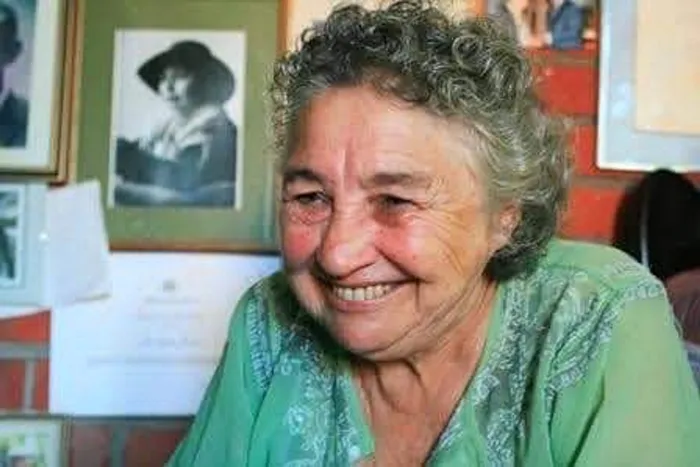Gladys Thomas: a voice against injustice

Author, poet, short-story writer, playwright, and anti-apartheid activist, Gladys Thomas.
Ocean View has lost one of its gems with the death of author, poet, short-story writer, playwright, and activist Gladys Thomas, 87, on Saturday, April 2.
Ms Thomas was one of the first South African women of colour to have her poetry published, and she won multiple awards for her work over the years.
This month marks 15 years since Ms Thomas was awarded the Order of Ikhamanga in Silver for exposing the political injustices and human suffering of apartheid through her writing.
She was born Gladys Doreen Adams on December 14, 1934, in Salt River to a mixed-race couple, John Adams and Dorothy O'Riodan, an Irish woman, according to her son, Andre Thomas.
She lived with her mother in Salt River until she was 6 and then went to live with her father’s family in Lakeside.
Due to racial conflict at the time, she was not allowed to see her mother again and attended a school in Lakeside and later an Afrikaans Dutch Reform school in Retreat up to Standard 6 (Grade 4).
While she wanted to become a nurse, she left school at the age of 15 to work in a sweets factory and later a clothing factory.
At the age of 18, she married Albert Thomas, and the couple had three children, Andre, Adrian, and Tanja Thomas.
Andre said the family had settled in Simon’s Town but was relocated to Ocean View under the Group Areas Act.
This relocation, he said, had a profound effect on his mother and she started writing to voice her opposition to apartheid and expose the atrocities that it created.
Ms Thomas’s literary career started in 1967 when she began writing Cry Rage, which was co-authored by anti-apartheid activist and poet James Matthews.
It was published in 1971 and was the first poetry book to be banned in South Africa.
However, this did not stop Ms Thomas from writing, and during the time of the Soweto uprising, she submitted an unnamed play to the World Literary Competition and won first prize.
Since her work was so critical of apartheid, much of it was banned and she was detained by the security police.
In 1983, she attended the International Writing Program in Iowa City, and she began writing more, according to Andre.
Her work includes Six Stories of the Children of Crossroads (1986); The Wynberg Seven (1987), based on interviews with parents who watched their teenagers being taken into Pollsmoor Prison; and Spotty Dog and other Township Children's Stories (1989).
Ms Thomas received many forms of recognition for her work, including the Kwanzaa Award for her protest writing; the Bertrams V.O. Literary Award for her full-length play, Avalon Court: Dramatic Scenes on the Cape Flats, in 1990; the Molteno Medal for her contribution to literature in the Western Cape (2000); the Western Cape Department of Arts and Culture Award for Literature (2004); the South African Literary Awards (SALA) Literary Lifetime Achievement Award; and the State President’s Award (The Order of Ikhamanga in Silver) in 2007.
In 1991, she wrote The Time is Now, a localised adaptation of Waiting for Lefty by Clifford Odets, which was directed by her husband, Albert Thomas, and performed at a mini-festival linked to a Theatre Action Group seminar in 1991.
In 1993, Ms Thomas and her husband began a theatre group, Getwize Players. Their debut production was The Time is Now, with which they toured in the Cape Peninsula and featured at the Grahamstown Arts Festival.
She also ran a drama group for the children in Ocean View, and, in 2005, her play, Sex Can Wait, Aids Can't, a family drama with music and songs, was the first production by the Ocean View Players.
Ocean View activist and PR councillor for the Patriotic Alliance Aslam Richards said his grandmother had lived opposite Ms Thomas in Zodiac Road.
“She was the sweetest lady, and I remember going to her house with my mother,” he said of Ms Thomas. “She would always offer me something nice. My mother told me about her work and how she used her poetry to speak up about the injustices that happened in our country during apartheid.”
He said that in 2020 Ms Thomas had asked him to help with a protest march over the allocation of houses in the Dido Valley development (“Protest to halt housing project,” Echo October 29, 2020).
“She told me, ‘I am proud of what you are doing and keep doing it no matter how hard it gets.’ She also said she hoped she would still be alive to receive her land claim.”
Mr Richards said Ms Thomas had been loved by everyone in the community and would be remembered for her kindness and encouragement.
Amazwi South African Museum of Literature said it was saddened to hear of her death, and the presidency expressed condolences to Ms Thomas’s family, saying: “The president’s thoughts are with Ms Thomas’s daughter, Tania, and sons, Andre and Adrian, as well as her friends and the political and creative activists with whom she associated over many decades.”